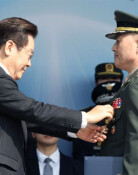[Column] Economy is nation¡¯s top priority
[Column] Economy is nation¡¯s top priority
Posted September. 22, 2000 15:39,
There are many countries in the global village. In fact, a total of about 200 countries took part in the Sydney Olympics.
Unfortunately, however, most of them are suffering from poverty, and their nations are unable to live a decent life. The World Bank estimated that 4.8 billion people out of the global population of 6 billion live in developing countries, and nearly a half of them are leading a life on US$2 in daily living expense, and 1.2 billion are living with only US$1 a day. What is more, most of the countries are unable to get of their status of absolute poverty.
Until 40 years ago, Korea was one of the world`s poorest countries. With energetic economic development since the 1960s, however, Korea has achieved the kind of economic development that took nearly a century for advanced countries through an industrial revolution in just 30 years and surprised the world.
The so-called Miracle on the Han River does not guarantee Korea`s entry into the group of advanced countries through steady economic growth. Nevertheless, Korea has made a mistake to hastily pop the Champaign bottle in late 1980s, as if its economic development was completed.
Workers demanded wage increases that are higher than the improvement in productivity, while entrepreneurs recklessly expanded their businesses through massive borrowing. Also, the government and political parties competed with each other to announce popular policies without consideration of their impact on the nation`s economy, thus contributing greatly to the structural insolvency of the Korean economy.
From the outset of the 1990s, they failed to work out a new national management strategy to effectively cope with the rapidly changing environment at home and abroad. They just suggested temporary measures like 100-day new economic plan and triggered insolvency of corporations and financial institutions.
As a result, Korea was hit by a foreign exchange crisis in late 1997 and suffered total economic crisis. Under the guidance of the International Monetary Fund, Korea has undertaken a series of structural policies in the government, corporation, financial institutions and labor sectors.
However, the nation is no longer feeling the crisis with temporary recovery of the economy thanks to various economy-boosting measures as well as favorable external circumstances, not as a result of still-lacking restructuring efforts.
Once again, politics has pushed the economy to the back seat. In addition, it is true that the rapidly changing relations between South and North Korea are breaking up the nation`s energy that has to be concentrated on economic restructuring. Isn`t it rather natural for international investors and bankers, who are fully aware of the situation, to have a feeling of unrest? In this connection, we shouldn`t forget the fact that nearly one-third of the market capitalization of stocks listed on the Korea Stock Exchange are owned by foreign investors and that the Korean market is fully integrated with the international financial market.
For this reason, the first step to solve the nation`s economic trouble is to restore confidence in the Korean economy in the global financial market. We shouldn`t blame the external circumstances. It is urgent for Korea to correct the top priority of the national policy. It is vital to rebuild the economy for the nation`s survival, and that will make it possible to raise massive financial resources to help North Korea restore its economy, thus contributing to eventual unification of the two Koreas.
The government is required to work out a comprehensive plan for restructuring, which includes a precise schedule for restructuring of individual corporations as well as financial institutions, as soon as possible.
At the same time, the head of the government`s economic team, which has both authority and responsibility, is required to persuade international bankers and investors. Also, the political parties are required to take an initiative in the nation`s economic management. Both the ruling party and the opposition need to show international society that they are working hard through revision of relevant laws related to economic restructuring. The nation is required to participate in the future-oriented economic restructuring.




![지하철 타고 가는 북한산성…외국인도 반한 ‘K등산 맛집’[전승훈 기자의 아트로드]](https://dimg.donga.com/c/138/175/90/1/wps/NEWS/IMAGE/2026/01/10/133120824.1.jpg)


